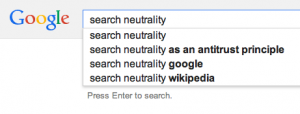Mugshot Mess Provides A Reminder: You Don’t Want “Search Neutrality”
 We all want a search engine to find information as quickly and accurately as possible–right up to the moment when it points users to unflattering details about, or allegedly about, us.
We all want a search engine to find information as quickly and accurately as possible–right up to the moment when it points users to unflattering details about, or allegedly about, us.
The latest instance of this dynamic played out over after the New York Times posted a lengthy feature by David Segal about the profitable and thoroughly sketchy business model of mugshot Web sites.
These operations scrape photos of just-arrested individuals taken and posted by local police departments across the country, then engage in the usual search-optimization routines to make them easily findable. For many people without much of a profile online, a mugshot link may become their most prominent search result.
Should you not care for the newfound thug cred lent by that search visibility, the mugshot sites will offer to take down the photo for a removal fee that can run to a few hundred dollars.
It looks a lot like classic extortion, except it’s built on publicly available data that should be visible–it’s reasonable to want to know if a potential hire, either for babysitting or for elected office, has an arrest record.
The extra wrinkle here is that mugshot sites as a whole lack what the sci-fi author Isaac Asimov once termed “the fundamental honesty of honorable corruption”–that is, they don’t stay bribed.
As Segal described the experience of one Florida woman who said she had fought off an abusive boyfriend’s attack and then briefly got hit with domestic-violence charges herself: “She paid $30 to have the images taken down, but they soon appeared on other sites, one of which wanted $400 to pull the picture.”
The NYT’s attention was followed by changes: A revision to Google’s search algorithm pushed many mugshot-site links off the first page of search results, close to a death penalty for Web visibility. And MasterCard, Discover, American Express and PayPal were all dropping support for mug-shot sites as customers.
(As it turns out, the NYT can’t take credit for Google’s reversal. Back in February, John Hochman wrote an opinion piece for Search Engine Land asking Google to recognize that mugshot sites violated its own rules about duplicate or copied content. Google had noted that post, search engineer Matt Cutts wrote in a tweet, and started revising its algorithm.)
So was this search site being “neutral” when it pointed users to pages on the Web that many people are legitimately curious about, or when it changed its search formula after public pressure? And what role should public or legal pressure play in those shifts?
This isn’t some abstract discussion. Copyright holders routinely send takedown requests to search sites, demanding the removal of links to sites hosting allegedly infringing copies, under the Digital Millennium Copyright Act’s “safe harbor” provisions.
That section has been repeatedly abused to try to remove embarrassing local-news clips, an unflattering interview, and a documentary about the Pirate Bay.
Group coercion can have a persuasive effect too. In a melodramatically-titled post at GigaOM (“First they came for the mugshot websites, but I said nothing…”), Mathew Ingram worried that the quick shunning of mugshot sites “could quickly become a slippery slope.”
He cited Amazon kicking WikiLeaks off its S3 cloud hosting in 2010. And he’s right–most companies will stop doing business with other companies if staying in bed with them will make them look sufficiently bad.
Ingram’s post, however, never mentioned the existence of competing search engines or social media’s role as an alternative traffic source.
It also should have noted the cockroach-like tenacity of spammers and malware distributors that have long since been cut off from most respectable payment processors.
And what’s the alternative? Additional laws determining who isn’t worthy of a prominent search result or an easy credit-card transaction look bad, but making a site or a payment processor in an open market do business with firms it finds loathsome raises other issues.
In comparison, a subjective regime of public shaming looks like not a bug but a feature. And it still leaves the collective remedy of government action under existing laws about fraud, false advertising and other commercial misconduct–as well as the individual remedy of remembering to use more than one search site.








